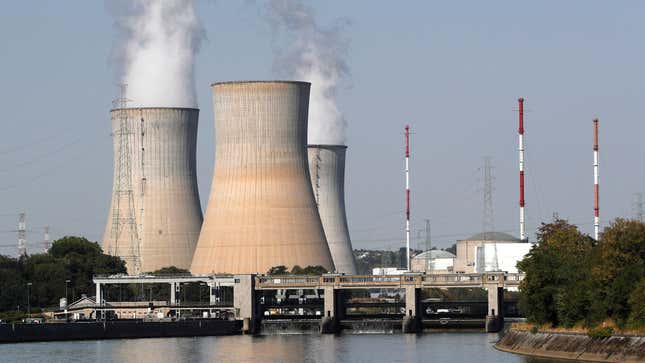Hello Quartz readers!
I’m in Seattle this week. If you are too, and want to meet up for a chat after work, let me know. It’ll be nice to see some of you in real life and talk more about energy and the climate crisis.
Now, let’s return to regular programming. Here’s what happened over the past week that helped or harmed the world’s chances to cut greenhouse-gas emissions to zero.

🔽 Decreases emissions
1️⃣ China’s model of state capitalism stepped in to save an electric-vehicle (EV) company. Shanghai-based firm NIO, which is listed on the New York stock exchange, reported a net loss of $390 million in the first quarter and is struggling to deliver on its growth plans. Beijing, however, cannot afford to see one of its darling EV companies fail, and thus a state-owned fund has injected nearly $1.5 billion to provide a safety net. (Read more in Quartz’s field guide on China’s electric-car boom.)
2️⃣ Two large energy-storage projects could help increase the share of variable renewables that can be added to the grid. In Australia, the government is backing the expansion of a pumped-hydro storage facility to the tune of A$5 billion ($3.5 billion). When there is excess electricity available water is pumped up a dam; when the electricity is needed, the water is allowed to fall back down on a turbine. In the US, the Advanced Clean Energy project is hoping to do the same, but instead of water the project aims to store compressed air or hydrogen in a huge salt cavern.
3️⃣ South Africa’s long-delayed carbon tax came into force. The idea was first proposed in 2010, but opposition from mining, steel, and utility businesses held it back. It’s a modest start, with the tax rate of only about $8 per metric ton of carbon dioxide. Nevertheless, it’s a signal to rich countries—looking at you, France—that even poor countries are doing their part in the climate fight.
4️⃣ A new study shows that carbon dioxide could be used to enhance recovery of oil and gas found in shale deposits. Currently, the process of shale fracking involves injecting large amounts of water to push out fossil fuels. The use of carbon dioxide, which if managed properly could remain in the ground, can help lower the emissions associated with the use of extracted fossil fuels. (Read more in Quartz’s deep dive on carbon-capture technology.)
5️⃣ In recent federal elections, Australia voted for coal. It re-elected Scott Morrison, who promised to help open new coal mines in Queensland. This week, the most controversial of those mines, owned by the Indian billionaire Gautam Adani, received one of the last two permits needed to begin mining. At the same time, however, investors abandoned an even larger coal mine next to Adani’s.
Stats to remember
As of May 30, the concentration of carbon dioxide in the atmosphere was 414.48 ppm. When I was born in 1987, it stood at 348 ppm. The human species—which is only 200,000 years old—has never lived on a planet with such high greenhouse-gas concentrations.

0️⃣ Net-zero (for now)
1️⃣ What do 10,000 dead puffins in Antarctica, heatwaves in Japan, and tornadoes in middle America have in common? The emerging field of attribution science. By using huge amounts of data and smart algorithms, scientists are now able to judge how much more likely events occur because of human-induced climate change. All of those events had strong markers of the climate crisis all over them.
2️⃣ Far-right eurosceptic parties were supposed to win at the European parliamentary elections. Less expected were big wins for green parties across the European Union. They increased the number of seats they hold in the European Parliament from 52 to 71 (out of 751), putting the green coalition in a better position to have an influence over big decisions.
3️⃣ Do you find yourself avoiding the news? You’re not alone. Academics think that we’ve reached “peak negativity” and recommend that some journalism would better serve audiences by focusing on solutions.
4️⃣ Bill Gates and the EU launched Breakthrough Energy Ventures Europe, a €100 million fund to push clean-energy innovation. It’s part of a larger push that Gates and his billionaire friends are making towards funding clean-energy startups across the world and pushing governments to invest greater sums in clean-energy R&D.
5️⃣ More than 80 countries may increase their ambition under the Paris climate agreement, agreeing to cut emissions faster. Although the agreement has almost every country in the world committed to keep global average temperatures from rising “well below” 2°C, current pledges will see us blow past a 3°C rise. “As secretary-general of the UN, I have many battles,” says António Guterres. “But as a grandfather, the struggle against climate change is the fight of my life.”
Worth watching
Air pollution kills more than 9 million people each year. To truly appreciate that figure, I hope you’ll watch Under the Dome, a 2015 documentary made by journalist Chai Jing, which China banned within four days of its release. The powerful movie is a reminder that cutting fossil-fuel use wherever possible has benefits far beyond simply fighting the climate crisis.

🔼 Increases emissions
1️⃣ Rich countries could lose up to two-thirds of their nuclear fleet by 2040. That would be bad for hitting climate goals. Nuclear power is the second-largest carbon-free source of electricity, after hydropower. Countries that have aging nuclear fleets should do more to maintain them, because replacing both fossil fuels and nuclear with renewables will be much more expensive.
2️⃣ Finland has decided to end the use of coal by 2029. But that means it may have to replace the fuel with imported wood. Although a full life-cycle analysis hasn’t yet been done, it’s possible that such a move could end up with Finns increasing total greenhouse gas emissions.
3️⃣ Australia‘s annual emissions increased for a fourth year. The new government has shrugged off the increase, saying that Australian LNG exports are helping the world replace coal as fuel. The country is expected to achieve 50% renewables mix in its electricity grid by 2030, but without cutting resource-extraction emissions there’s no guarantee it will be able to hit Paris climate goals.
4️⃣ All the climate-related resolutions at the annual shareholder meetings of Chevron and ExxonMobil failed to secure a majority. That said, the total number of climate resolutions being voted on increased.
My best wishes for a productive week. Please send any NIO cars, puffins, or secret documents to akshat@qz.com.